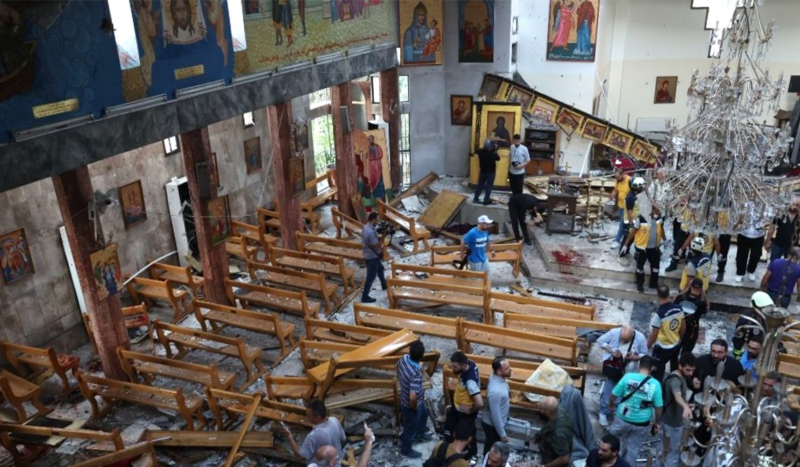
Greek Orthodox Mar Elias Church in Damascus, Syria by Ali Haj Suleiman / UNOCHA
Christians in Syria are grappling with whether to remain in or emigrate from their homeland as they continue to witness deadly anti-Christian attacks, such as the recent murder of a Christian businessman and the June 22 bombing at a Greek Orthodox church in Damascus that killed at least 25 people.
AsiaNews reported July 12 that the tension for Syrian Christians, who are “torn between the desire to remain in their homeland and contribute to its rebirth after years of war and the flight of Bashar al-Assad, and the choice to emigrate,” has intensified since the murder of George Ishoh, a Christian father and goldsmith.
Masked gunmen shot Ishoh outside his home July 9, in a targeting that reportedly followed his refusal to pay protection money to an armed gang, according to the SyriacPress. His wife and two children were not home when the murder occurred.
AsiaNews reported that murders and intimidations against minorities such as Christians have worsened amid a lack of government protection, something the interim President Ahmen al-Sharaa and the new government, the Hayat Tahrir al-Sham (HTS), had previously assured.
“For many Christians, the al-Sharaa government is more interested in implementing a Sharia-inspired dress code, which is also binding on religious minorities, than in ensuring protection and security for the population, even snubbing recent threats of attacks,” AsiaNews reported.
A survey conducted in May by Etana Syria found that only 45% of Christians felt safe under the current political authorities, according to AsiaNews. The news outlet added that many Christians now view migration as “the only solution” to the fear.
Jeff King, president of the watchdog organization International Christian Concern, told the Christian Post that the June 22 suicide bombing at the Greek Orthodox church is a “brutal reminder” that there are “radicalized jihadi groups in Syria that seek to eliminate Christians from the country,” the Christian Post reported July 11.
“President al-Sharaa must speak out for his country’s religious minorities and acknowledge the ongoing persecution there,” King said.
According to the Christian Post, “al-Sharaa condemned the bombing as a crime against all Syrians” the day after it occurred, but for a number of advocates, such words of solidarity from the new government ring hollow.
Brian Orme, president and CEO of Global Christian Relief, told the Christian Post that the bombing was “not an isolated incident.”
“While the leadership claims there will be freedom of religion, these assurances increasingly feel like empty words,” Orme said. “This is not an isolated incident but part of a broader pattern where Christians remain vulnerable to targeted violence and intimidation.”
Richard Ghazal, executive director of advocacy organization In Defense of Christians, wrote in a July 7 op-ed for The Hill that the bombing “illustrates a sobering reality” the world cannot look away from.
“Syrian Christians, who have endured centuries of political repression and sectarian violence, now face an existential crisis,” Ghazal wrote. “With every suicide bombing, every desecrated church, every community exodus, Syria edges closer to losing a two-millennia-old spiritual and cultural pillar.”
>> European Parliament condemns anti-Christian violence in Syria after church bombing <<

